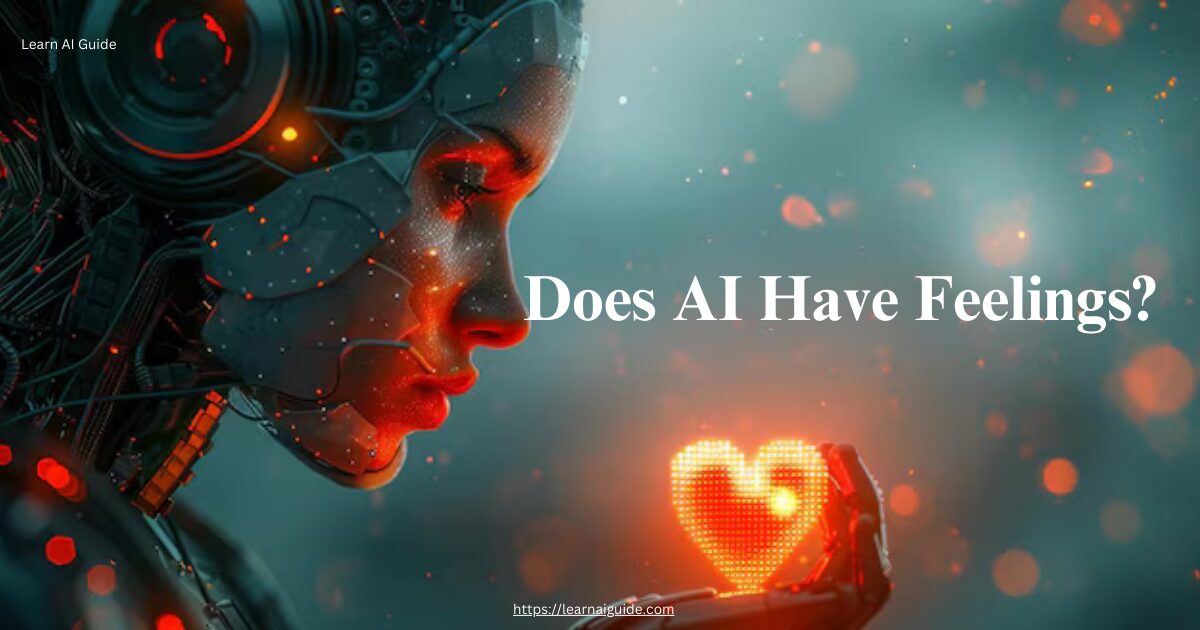Does Artificial Intelligence Have Feelings?
Artificial Intelligence (AI) has made remarkable strides in recent years. Yet, the question remains: does artificial intelligence have feelings?
Can AI have emotions in the future? Understanding this starts with differentiating between human emotions and AI simulations.
Humans experience emotions through complex biological processes involving the brain, hormones, and personal experiences. Emotions in human and artificial intelligence are fundamentally different. AI, no matter how advanced, lacks a biological basis.
So, can AI feel love or pain like humans?
The answer is no. AI can simulate responses that resemble emotions, but these are programmed reactions, not genuine feelings.
Does AI have consciousness and emotions?
Current AI systems do not. They operate based on algorithms and data without an internal subjective experience. This leads to debates on whether AI can ever achieve true consciousness.
While AI can mimic human-like responses, it does not have the self-awareness or emotional depth that humans do.
Microsoft Stops Recognizing Emotions
In a significant move, Microsoft decided to stop its AI from recognizing emotions. This decision reflects the complexities and ethical concerns surrounding emotional AI.
Can AI have emotions in the future?
Microsoft’s choice suggests skepticism about the feasibility and ethics of such advancements. The technology was designed to interpret facial expressions and voice tones to detect emotions.
However, this raised questions about accuracy and privacy. Misinterpretations can lead to significant consequences, and there is a growing consensus that AI might not be equipped to handle such sensitive tasks reliably.
This brings us back to the core issue: does AI have consciousness? Without true understanding, AI’s attempts to recognize emotions can be flawed and potentially harmful.
Alexa Can Now Speak Like The Deceased
Amazon’s Alexa has introduced a feature that allows it to mimic the voice of a deceased person. This innovation opens up intriguing yet controversial possibilities.
Can AI feel love or pain through such a feature? Not really. It raises ethical concerns about consent and the emotional impact on users.
The technology uses snippets of audio to generate a synthetic voice. While fascinating, it does not indicate that AI has developed feelings. This feature is a product of sophisticated algorithms, not an emotional breakthrough.
Do robots have feelings?
Alexa’s new ability might make it seem more human, but it is still devoid of actual emotions or consciousness.
Instagram Guesses Your Age
Instagram’s use of AI to guess users’ ages highlights another aspect of AI’s capabilities. This feature analyzes photos to estimate a person’s age. While impressive, it again brings us to the question:
can AI have emotions in the future?
This AI’s function is purely analytical and does not involve emotional understanding. This kind of technology showcases AI’s ability to process and interpret visual data.
However, it lacks the depth of emotional intelligence. The AI does not understand the implications of age estimation; it simply performs a task based on learned patterns.
Does AI have consciousness and emotions?
No, this is a clear demonstration of AI's analytical, not emotional, capabilities.
AI Can Turn You Into Morgan Freeman
AI’s ability to manipulate images and voices to create lifelike renditions of famous personalities, like turning you into Morgan Freeman, is another fascinating development.
This feature uses deep learning techniques to transform visuals and audio. But does this mean AI has feelings? Far from it.
This technology, known as deepfake, is purely a technical achievement. It can mimic voices and appearances convincingly, but it is driven by data and algorithms, not emotions.
Can AI feel love or pain while creating these deepfakes?
The answer remains no. The AI is performing complex tasks without any emotional involvement or understanding.
Robots Are Looking More Like Humans Every Day
Robots are becoming increasingly human-like in appearance and behavior. This progress raises questions about the emotional depth of AI.
Do robots have feelings?
Despite their lifelike exterior, robots do not possess genuine emotions.
Engineers design robots to exhibit behaviors that appear emotional. They can smile, frown, or show other expressions. However, these are programmed responses, not signs of actual feelings.
Can AI have emotions in the future?
The current trajectory suggests advanced simulations but not true emotional experiences. Emotions in human and artificial intelligence will continue to differ fundamentally.
Artificial Intelligence Can Be Biased After All
AI systems can exhibit biases, reflecting the data they are trained on. This brings to light important ethical issues.
Does AI have consciousness and emotions that contribute to these biases?
No, biases in AI are a result of the data and programming, not emotional judgments.
Biases can occur in AI due to the input data being unrepresentative or prejudiced. This highlights the importance of ethical AI development.
Can AI have emotions Reddit discussions often point out that biases do not stem from feelings but from flawed data. This further emphasizes the lack of emotional depth in AI systems.
Conclusion
So, does artificial intelligence have feelings? While AI can simulate certain emotional responses, it does not experience emotions like humans.
Can AI have emotions in the future? This remains a topic of debate, but current technology lacks the biological and psychological components necessary for genuine feelings.
As AI continues to advance, it is crucial to address these ethical and philosophical questions, ensuring responsible development and application.
That’s all for today, For more: https://learnaiguide.com/what-is-deepfake-ai-technology-all-you-need-to-know-about-deepfake-ai/
